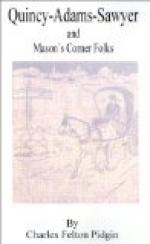“That’s it exactly,” said Quincy; “only I wish a receipt from you for the document.”
“Certainly,” replied Curtis. As he raised the lid of his old-fashioned desk the letter fell to the floor. The envelope had received rough treatment in its progress from hand to hand, and it was not strange that when it struck the floor one corner was split open by the fall.
As Quincy stooped to pick it up, he noticed that something that resembled a small piece of white cloth dropped from the broken corner of the envelope. When he picked it up to replace it, he saw that it was a small piece of white cotton cloth, and his quick eye caught the name “Linda Fernborough” stamped thereon with indelible ink. He said nothing, but replacing the piece of cloth passed the package to Curtis, who enclosed, sealed, and endorsed it, and gave a receipt therefor to Quincy.
“I will put this in my big steel vault,” said he, as he went into another room.
Quincy knew that Curtis would accept no fee for such a slight service, so placing a five dollar greenback under a paperweight, he quietly left the office and was out of sight long before Curtis, with the bill in his hand, ran down stairs, bareheaded, and looked up and down the street in search of him.
Five minutes later Quincy reached his aunt’s house. A “Buttons,” dressed in blue livery, opened the door, and Quincy was ushered into the long parlor, which ran the full depth of the house, some sixty feet, in which he had passed many pleasant evenings. He sent up his card, and in a few moments Buttons returned and delivered the speech which Mrs. Chessman had taught him and which he had learned by heart: “Mrs. Chessman desires that you will come up at once.”
Quincy bounded upstairs, to the evident astonishment of Buttons, and made his way to the front chamber, which he knew was his aunt’s room. She loved the sunlight, and it was a constant visitor in that room, summer and winter. His aunt did not greet him with a “how do you do?” and a hand-shake. Instead of such a formal reception, she gave him a hearty hug and kissed him three times, once on the forehead, then on the cheek, and finally on the lips, in which latter osculation Quincy took part.
His aunt led him to an easy-chair, then threw herself upon a lounge opposite to him. She eyed him attentively for a moment.
“Quincy,” said she, “you are better looking than ever; you’re almost as good looking as Robert was, and he was the handsomest man I ever saw. How many different country girls have you kissed since you saw me last?”
“I kept the count,” said Quincy, “till I went to a surprise party a week ago Monday, and then I lost it.”
“Of all the kisses that you have had, whose do you prize the most?”
“Those from my beloved Aunt Ella,” replied Quincy.
Aunt Ella smiled and said, “You know how to keep on the right side of an old woman who has got money.”




